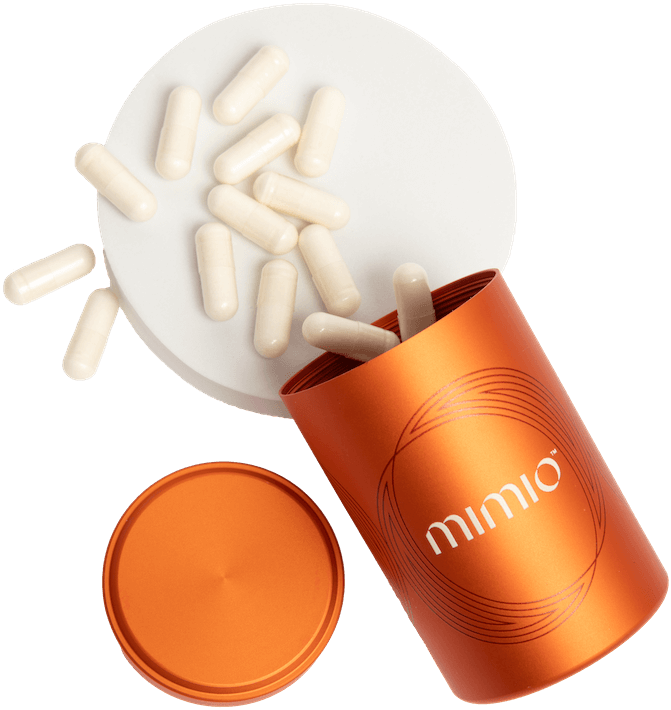Spermidine, 1-Methylnicotinamide (1-MNA), Palmitoylethanolamide (PEA), and Oleoylethanolamide (OEA) are all endogenously produced human metabolites that also appear widely in the food stream as constituents of plant and animal products (fruits vegetables, meats, grains etc.). Multiple studies of these metabolites have revealed each to have numerous beneficial effects including improvements in clinical markers of disease, animal disease models, cellular/biochemical functionalities, and even the ability to extend lifespan1–4. Here we shall briefly review each metabolite and their documented effects on health and cellular functionality as well as their potential benefits for use in human supplementation.
Spermidine is a polyamine naturally synthesized in plants, animals, and microorganisms as a product of protein degradation1,5. It is found widely throughout the food chain, but is most highly concentrated in wheat germ, soy, and fermented food products such as cheese and miso. Spermidine is most noted for its well-documented ability to induce cellular autophagy6,7 and has recently gained a great deal of scientific attention for its ability to enhance lifespan and healthspan in model organisms1,6–8. Spermidine’s beneficial effect on longevity is thought to be mediated through multiple mechanisms including the induction of systemic autophagic processes,6–8 modulation of inflammation, lipid metabolism, and cell growth and proliferation1,8–10. The lifespan extending effects of spermidine have also been extrapolated to humans with higher lifelong intakes of spermidine being correlated to enhanced human lifespan in epidemiological studies11,12. Moreover, recent clinical studies of spermidine supplementation have shown significant benefits on cognitive performance and memory in elderly populations with dementia and cognitive decline suggesting a neuroprotective role of spermidine in aging and cognition. The typical Mediterranean diet is estimated to contain 26mg/day of spermidine and the Swedish Nutritional Recommendations Objectified (SNO) recommends an average daily intake of 30mg of spermidine13. However, the average American intake of spermidine is currently estimated at only 8mg/day5. Given this disparity, spermidine supplementation in a US population may prove to be highly beneficial towards improving the typical western diet that is otherwise deficient in a diverse range of natural, nutrient dense foods that would contain spermidine.
References
1. Madeo, F., Eisenberg, T., Pietrocola, F. & Kroemer, G. Spermidine in health and disease. Science (2018) doi:10.1126/science.aan2788.
2. Gebicki, J. et al. 1-Methylnicotinamide: A potent anti-inflammatory agent of vitamin origin. Pol. J. Pharmacol. (2003).
3. Mattace Raso, G., Russo, R., Calignano, A. & Meli, R. Palmitoylethanolamide in CNS health and disease. Pharmacological Research (2014) doi:10.1016/j.phrs.2014.05.006.
4. Thabuis, C. et al. Biological functions and metabolism of oleoylethanolamide. Lipids (2008) doi:10.1007/s11745-008-3217-y.
5. Madeo, F. et al. Nutritional Aspects of Spermidine. Annual Review of Nutrition (2020) doi:10.1146/annurev-nutr-120419-015419.
6. Eisenberg, T. et al. Induction of autophagy by spermidine promotes longevity. Nat. Cell Biol. (2009) doi:10.1038/ncb1975.
7. Gabandé-Rodríguez, E., M. Gómez de las Heras, M. & Mittelbrunn, M. Control of Inflammation by Calorie Restriction Mimetics: On the Crossroad of Autophagy and Mitochondria. Cells (2019) doi:10.3390/cells9010082.
8. Eisenberg, T. et al. Cardioprotection and lifespan extension by the natural polyamine spermidine. Nat. Med. (2016) doi:10.1038/nm.4222.
9. Pietrocola, F. et al. Caloric Restriction Mimetics Enhance Anticancer Immunosurveillance. Cancer Cell (2016) doi:10.1016/j.ccell.2016.05.016.
10. Choi, Y. H. & Park, H. Y. Anti-inflammatory effects of spermidine in lipopolysaccharide-stimulated BV2 microglial cells. J. Biomed. Sci. (2012) doi:10.1186/1423-0127-19-31.
11. Madeo, F., Carmona-Gutierrez, D., Kepp, O. & Kroemer, G. Spermidine delays aging in humans. Aging (2018) doi:10.18632/aging.101517.
12. Madeo, F., Bauer, M. A., Carmona-Gutierrez, D. & Kroemer, G. Spermidine: a physiological autophagy inducer acting as an anti-aging vitamin in humans? Autophagy (2019) doi:10.1080/15548627.2018.1530929.
13. Ali, M. A., Poortvliet, E., Strömberg, R. & Yngve, A. Polyamines in foods: Development of a food database. Food Nutr. Res. (2011) doi:10.3402/fnr.v55i0.5572.



